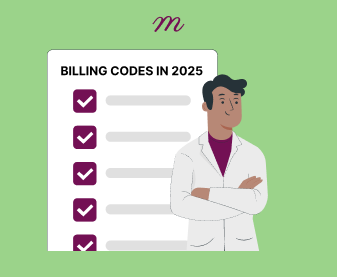Accurate billing is the backbone of thriving therapy practices. Understanding Behavioral Health CPT Codes is essential, whether you’re writing your own case notes or reviewing supervisee notes. These codes not only ensure reimbursement for your services but also safeguard compliance, streamline operations, and provide critical protection during audits.
In this guide, we’ll break down the Behavioral Health CPT billing codes relevant for 2025, highlight updates to watch for, and share strategies to optimize your billing process. Equip your practice with the knowledge to succeed in the ever-evolving landscape of behavioral health billing.
Behavioral Health CPT Code Updates for 2025
Each year, the American Medical Association (AMA) reviews and revises CPT codes to reflect evolving practices and technologies. Here’s what therapists should know for 2025:
1. Telehealth-Specific CPT Codes
Telehealth, a staple since the pandemic, continues to expand. For 2025, updates include:
- Permanent addition of telehealth codes: Codes like 90791 (psychiatric diagnostic evaluation) and 90834 (psychotherapy, 45 minutes) are now permanently reimbursable for telehealth.
- Modifiers for audio-only sessions: The use of codes like 93 allows for billing sessions conducted by phone when video is inaccessible.
- Medicare telehealth extensions: Medicare maintains its support for telehealth behavioral health services, with expanded flexibility for all geographic areas.
2. Prolonged Services Codes
Therapists can now bill for extended session times using these new codes:
- 99417: Prolonged psychotherapy, beyond 60 minutes.
- 993X0: Prolonged evaluation and management (E/M) services with psychotherapy.
3. Measurement-Based Care (MBC) Integration
Measurement-Based Care (MBC) is a systematic approach to mental health treatment that emphasizes the use of standardized tools to assess a client’s symptoms, monitor progress, and adjust treatment plans accordingly. By incorporating evidence-based assessments like the PHQ-9 for depression or GAD-7 for anxiety, therapists can demonstrate measurable outcomes to insurers and clients alike.
As MBC becomes central to evidence-based practice, codes like the following gain importance:
- 96127: For scoring emotional/behavioral assessments (e.g., PHQ-9).
- 96160: For client-completed health risk assessments.
4. Collaborative Care Model (CoCM) Codes
The Collaborative Care Model (CoCM) is a team-based approach designed to address mental health conditions within primary care settings. These codes are particularly valuable for therapists working in integrated care settings or partnering with medical practices. For therapists participating in CoCM, specific CPT codes enable billing for these collaborative services:
- 99492: Initial psychiatric collaborative care management (70 minutes in the first month).
- 99493: Subsequent management services (60 minutes per month).
- 99494: Additional 30 minutes of care management beyond the primary time blocks.
These codes align with the industry shift toward integrated care and can be a valuable revenue stream if your practice coordinates with primary care providers.
Why CPT Codes Matter for Behavioral Health
CPT codes are the standardized system for documenting medical, surgical, and diagnostic services. For behavioral health, these codes ensure:
- Reimbursement from insurance companies: Accurate coding communicates the services provided and their value.
- Legal compliance: Misuse of CPT codes—intentionally or unintentionally—can lead to audits, claim denials, or even fines.
- Operational efficiency: A solid understanding of CPT codes reduces errors, speeds up claim processing, and minimizes time spent on appeals.
CPT Codes Every Therapist Should Know
Below are some of the most-billed CPT codes for mental health care , organized by service type:
Psychiatric Diagnostic Evaluations
- 90791: Initial diagnostic evaluation without medical services.
- 90792: Includes medical services (e.g., medication assessment).
Psychotherapy (Individual)
- 90832: Psychotherapy, 30 minutes.
- 90834: Psychotherapy, 45 minutes.
- 90837: Psychotherapy, 60 minutes.
Psychotherapy (Family and Couples)
- 90846: Family psychotherapy without the client present.
- 90847: Family psychotherapy with the client present.
- 90849: Multiple-family group psychotherapy.
Group Therapy
- 90853: Group psychotherapy for specific populations or focused issues.
Crisis Services
- 90839: Psychotherapy for a crisis, first 60 minutes.
- 90840: Additional 30 minutes of crisis therapy.
Add-On Codes
- +90785: Interactive complexity (e.g., working with interpreters).
- +99354: Prolonged services in the office (30–74 additional minutes).
Accurate Coding as Audit Protection
Audits are an unavoidable part of working with insurance payers, and accurate CPT coding is your best defense. Insurance companies and regulatory agencies routinely review claims to ensure they meet documentation standards.
- Why audits happen: Red flags, such as repeated use of a single code or insufficient documentation, can trigger an audit.
- How accurate coding helps: Proper CPT codes, supported by comprehensive session notes, demonstrate compliance and reduce penalties.
Using tools like Mentalyc to streamline documentation not only improves coding accuracy but also ensures thorough and defensible records.
How to Avoid Common CPT Coding Pitfalls
Many therapists stumble over the nuances of CPT coding, leading to claim rejections or delayed payments. Here are some practical tips:
1. Understand Time Requirements
Each CPT code includes specific time frames. For example:
- 90834 (45-minute therapy) requires at least 38 minutes spent face-to-face with the client.
- 90837 (60-minute therapy) requires at least 53 minutes.
Using these codes without meeting the time requirement can result in denied claims.
2. Use Modifiers Appropriately
Modifiers clarify details about the session, such as:
- GT or 95: Services provided via telehealth.
- 25: Significant, separately identifiable services (e.g., psychotherapy alongside an E/M service).
3. Stay Updated on Insurance Guidelines
Insurance companies often have unique requirements for CPT codes. For example, some insurers may not reimburse for 90837 (60-minute sessions) but will cover 90834 (45-minute sessions).
4. Document Thoroughly
Clear, accurate documentation is your best defense against audits. Use tools like Mentalyc to streamline note-taking and ensure your records align with billing codes. For example, progress notes should detail the client’s symptoms, therapeutic interventions, and progress toward goals, tying these directly to the billed CPT code.
The Role of AI in CPT Billing and Documentation
Administrative tasks can take up a significant portion of a therapist’s day, but tools like Mentalyc are changing the game by automating:
- Session note generation: AI converts recordings into structured notes aligned with CPT codes.
- CPT-based templates: Reduce errors by pre-selecting templates tied to specific codes.
- Time tracking for billing: Automatically calculates session durations to match billing requirements.
By integrating AI, therapists can save time and focus more on clinical work while ensuring compliance.
Looking Ahead: Behavioral Health CPT Trends
The evolution of CPT codes reflects broader shifts in mental health care. For 2025 and beyond, watch for:
- Increased emphasis on outcomes-based care: Expect more codes related to measurement-based care, reflecting insurers’ focus on quantifiable results.
- Growth of integrated care models: Collaborative care and telehealth services will continue to expand, with new codes emerging to support these trends.
- AI and automation integration: As tools like Mentalyc grow in adoption, they may influence how practices streamline billing and compliance processes.
Final Thoughts
Mastering behavioral health CPT codes may not be the most exciting part of running a practice, but it is essential for financial stability and operational success. By staying informed about changes, using AI tools like Mentalyc, and maintaining accurate documentation, therapists can navigate the complexities of billing with confidence.
Whether you’re coding for telehealth sessions, prolonged family therapy, or collaborative care consultations, precision and consistency are key. With the right tools and knowledge, you can simplify administrative tasks and dedicate more time to helping clients thrive.
————-
Ready to streamline your session documentation? Try Mentalyc and experience how AI can transform your practice.
Why other mental health professionals love Mentalyc

“It’s so quick and easy to do notes now … I used to stay late two hours to finish my notes. Now it’s a breeze.”
Licensed Professional Counselor

“By the end of the day, usually by the end of the session, I have my documentation done. I have a thorough, comprehensive note … It’s just saving me hours every week.”
CDCII

“A lot of my clients love the functionality where I can send them a summary of what we addressed during the session, and they find it very helpful and enlightening.”
Therapist

“It takes me less than 5 minutes to complete notes … it’s a huge time saver, a huge stress reliever.”
Licensed Marriage and Family Therapist







